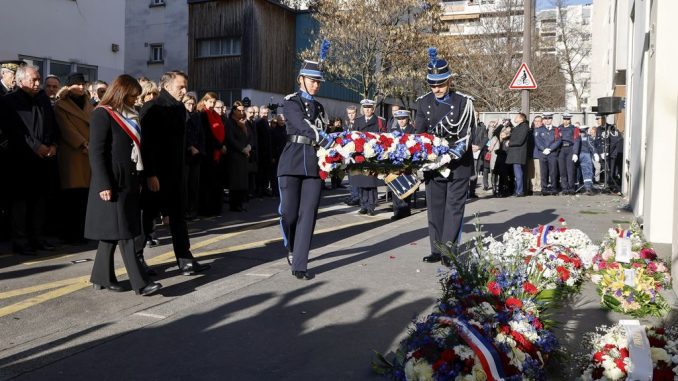
French commemorate Charlie Hebdo attack, view on mockery and satire has changed
The 2015 terror attack on the weekly magazine Charlie Hebdo was commemorated in Paris. A wreath was laid and a minute’s silence was observed. This happened in the presence of President Emmanuel Macron and Mayor Anne Hidalgo.
Remembrance ceremonies were also held in two other places in Paris. The police officer who was murdered on the street by the terrorists was commemorated. There was also a meeting at the Jewish supermarket where four people were killed, two days after the attack on Charlie Hebdo.
All commemorations were “sober and simple, just like every year, at the request of the relatives”, the municipality of Paris said.
Mohammed cartoons
Exactly ten years ago, on January 7, 2015, two terrorists entered the Charlie Hebdo editorial office and cold-bloodedly shot eleven people dead. Reason for the attack were Mohammed cartoons that Charlie Hebdo had published.
What happened on January 7, 2015? Watch the video below for a quick recap
Looking back at the attack on the Charlie Hebdo editorial office in Paris
Across the country today, there is widespread reflection on the ten years that have passed since the attack. Radio and television channels pay attention to it all day long. New books have been published and interviews with survivors and documentaries are published and broadcast about the events at the time.
‘Unbreakable’
Charlie Hebdo came up with today a special number which looks back on the past decade. That happens as usual: sometimes seriously and often with ridicule. The front page features a cartoon of a reader holding a copy of Charlie Hebdo, sitting on top of the barrel of a Kalashnikov. “Unbreakable,” it says above. “Satire shows optimism and that has helped us through these tragic years,” writes editor-in-chief Riss. “He who wants to laugh, wants to live.”
The traumas of the survivors of Charlie Hebdo have not yet disappeared. Webmaster Simon Fieschi was seriously injured in 2015 and disabled for life. He died last year, probably by suicide, although this has not been officially confirmed.
Editor-in-chief Riss says on TV today: “I thought it would wear out over the years. But it doesn’t wear out.”
Cartoonist Coco told Le Monde this week: “I have to learn to live with it, but January 7 haunts me relentlessly. Their weapons and monstrous ideas opposite us: cartoonists with fountain pens, markers and pencils, who just want to make people laugh.”
Anger gone
For many Parisians and French people, the attack of ten years ago is still a painful scar. Sympathy for Charlie Hebdo has not disappeared. According to a poll conducted by the magazine, 62 percent of French people believe that religions can be criticized and mocked. Among Muslims this is 53 percent and among Catholics 59 percent.
But the anger that was there in 2015 over the massacre has disappeared. Life went on and France was hit by even more, and even bloodier, attacks in the years that followed. In 2016, 71 percent of French people said it ‘Je suis Charlie’ feeling to have. By 2023, 58 percent had.
Historian Laurent Bihl partly attributes this decline to the changing spirit of the times. “In the past, anything could be said. Nothing was sacred. Freedom of expression was central,” he said The Figaro. But now there is above all respect for everyone’s individual opinion. “Today it is no longer about respect for a principle, but about respect for the neighbor.”
Generation gap
This is also evident from the poll that Charlie Hebdo had done. A third of French young people (up to 35 years old) now believe that you should not simply mock people and religions in the name of freedom of expression. They often label ridicule as “discrimination” or “disrespect.” The researchers even speak of a generation gap, because older people have much less difficulty with ridicule and satire.
A feeling that seems to recur in all generations: missing solidarity. In January 2015, Charles Bousquet climbed the statue on Place de la République with an immense pencil to express his support for Charlie Hebdo: the images of these went all over the world. “It’s bizarre when you see how politically divided France is now. Then we were not divided. We were all together, we fought for the same goal,” he said on French TV.
In one report from that day in 2015, a pastry chef and a police officer can also be seen hugging each other during the demonstration in January. They have remained friends ever since. The baker says he finds it a shame that French politicians have not maintained the feeling of solidarity. The police officer says bitterly that the French people’s sense of solidarity only lasted a very short time. “It lasted a week, then it was over again.”

Be the first to comment